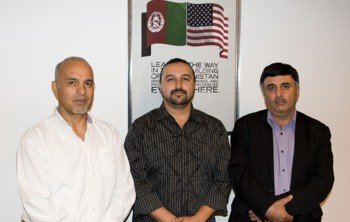Mission Essential Personnel
Mission Essential Personnel

Mission Essential Personnel Seeks Pashto and Dari Speakers
The Hacienda office of Mission Essential Personnel (MEP) has an unusual but very specific focus. "We specialize in improving reading, writing, speaking, and listening skills in Pashto, Dari, and English for prospective linguists who want to serve our warfighters as they execute their mission in Afghanistan," explains local recruiter Mustafa "Harris" Ehsan.
Headquartered in Columbus, Ohio, MEP provides language, intelligence, and technical and training solutions to the armed forces, civilian government, friendly foreign nations, and corporate clients. As the largest provider of language services to the United States military, the company operates five language academies (MEPLA) throughout the country. Along with the Pleasanton facility, it has locations in Carlsbad and Canoga Park, Cal.; Great Neck, N.Y.; and Chantilly, Va. Since opening in April 2008, the language centers have graduated 600 students through the program, more than 350 of whom are currently serving in the field.
In any given week, the Pleasanton MEPLA can have 35 students in class, with 20 more participating remotely. The goal is to train those who are already familiar with Afghan languages, such as immigrants from Afghanistan who have lived in the United States for many years. The amount of time students spend at the center varies according to their initial proficiency. Some need just a few weeks of refresher classes, but others, who might not have spoken the language for 20 years, need a few months to reacquire the skill. Harris comments that even people with limited experience can be trained to a professional level. "The academy has even trained to proficiency some students with zero starting skills, and has attracted linguists from as far as Tennessee to study here," he notes.
Once the students have completed their training, they are offered assignments in Afghanistan working alongside of American servicemen and women. What motivates someone to take on such a challenge? According to Harris, the students mention a variety of reasons for returning to their ancestral home. Undoubtedly a big appeal is "a very competitive salary." The length of time individual linguists stay varies; they can remain on assignment indefinitely. "I have members of my own family who have been doing this for seven years," Harris says. Those who stay receive roughly 10 days of paid leave every three months, allowing them to return home for visits.
The charm of the Afghan people is another attraction. "We are very hospitable," points out Harris, who was born in Afghanistan but came here at the age of two. "In our culture, people stop by the home at any time. Everyone drops what they are doing to attend to their guests. That's how we've been raised."
The language specialists also have a strong sense of mission. "These are pretty special people," he notes. They are also extremely rare. The number of Pashto speakers in the United States who can meet the military's requirements is approximately 3,000 - "a microscopic part of population." MEP's trained linguists can comprise as much as 50 percent of that total at any one time. Harris has built strong relationships in the Afghan communities throughout the East Bay to develop a broader group of candidates. MEP's new quarters in Hacienda are more conducive to the training classes, given by instructor Jamal Alokozai, and the central location makes it easy for students to access. For more information, visit meplanguageacademy.com.
Photo: (L to R) Gulahmad Noory, Harris Ehsan, and Jamal Alokozai of MEP.
Also in this issue...
- Booming Business Fuels Mercedes-Benz of Pleasanton Expansion
- Senior Helpers Offers Timely Care that Provides Peace of Mind
- Business Bits
- Executive Profile: Peter Gassner, Veeva Systems
- School of Practical Philosophy Leads Students on Journey of Self-discovery
- Mission Essential Personnel Seeks Pashto and Dari Speakers
- Get Connected with Hacienda's 2012 Transit Directory
- Tri-Valley Conservancy Builds Connections Through Upcoming Fundraisers
- East Bay EDA Symposium on September 18 to Help Small Businesses
- Sign Up for the Pleasanton Chamber's Healthy Habits Challenge
- Savor the Season
- Take the Hacienda Services Survey
- Hacienda Index
- Calendar




